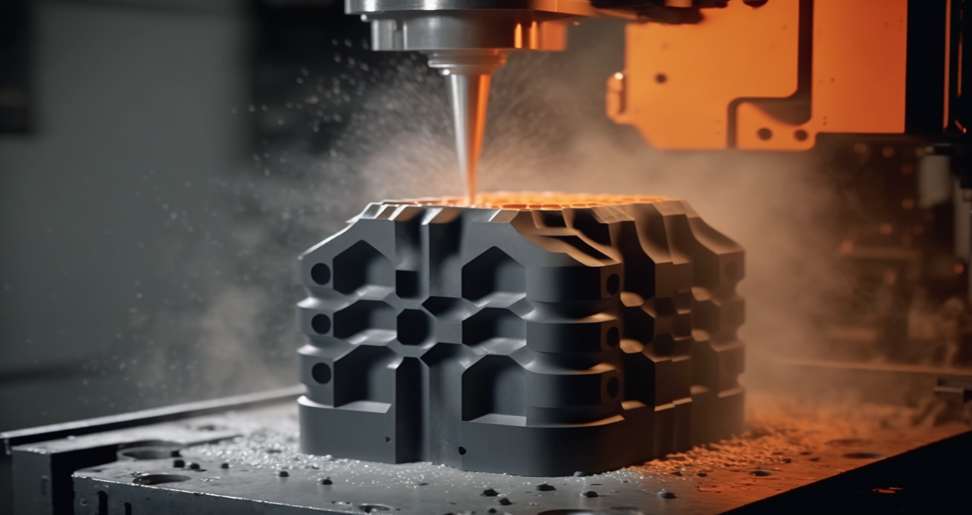The plastic mold manufacturing industry is undergoing a rapid transformation, driven by technological advancements, evolving consumer demands, and increasing sustainability concerns.The plastic mold manufacturing industry is undergoing a rapid transformation, driven by technological advancements, evolving consumer demands, and increasing sustainability concerns. This dynamic landscape is giving rise to innovative practices and processes that are redefining the industry.
In the following sections, we will explore key trends shaping the future of plastic mold manufacturing, including advancements in materials, digital transformation, sustainability initiatives, and the growing emphasis on customization.
This article explores some of the most significant trends shaping the future of plastic mold manufacturing.
Advanced Materials and Composites
The die casting mold development and application of new materials are revolutionizing the plastic molding industry.
High-Performance Polymers: The use of engineering-grade polymers is expanding, enabling the production of parts with enhanced properties such as strength, heat resistance, and chemical resistance.
Bio-Based and Sustainable Materials: The growing emphasis on sustainability is driving the adoption of bio-based plastics, recycled materials, and biodegradable options.
Composite Materials: Combining plastics with fibers or other materials creates composite molds with improved mechanical properties, weight reduction, and durability.
Digital Transformation and Automation
Digital technologies are reshaping the plastic mold manufacturing process.
Digital Twin Technology: Creating virtual replicas of molds and products enables simulation, optimization, and predictive maintenance.
Artificial Intelligence (AI) and Machine Learning: AI-powered systems can optimize mold design, predict tool life, and improve quality control.
Automation and Robotics: Implementing robotic systems for mold handling, machining, and assembly enhances efficiency and precision.
Additive Manufacturing Integration: Utilizing 3D printing for rapid prototyping and mold repair, accelerating product development.
Sustainability and Circular Economy
The plastic molding industry is increasingly focused on reducing its environmental impact.
Recycling and Remanufacturing: Adopting closed-loop systems to recycle plastic scrap and remanufacture molds.
Energy Efficiency: Implementing energy-saving technologies and processes to reduce carbon footprint.
Sustainable Materials: Prioritizing the use of bio-based and recycled plastics.
Waste Reduction: Minimizing plastic waste through optimized mold design and production processes.
Customization and Mass Customization
Consumer demand for personalized products is driving the need for flexible and adaptable mold manufacturing.
Rapid Molding Technologies: Enabling quick tool changes and shorter lead times for customized products.
Modular Mold Designs: Creating versatile molds that can be easily reconfigured for different product variations.
Digital Manufacturing: Utilizing digital technologies to facilitate mass customization and personalized product offerings.
Micro-Molding and Precision Manufacturing
The demand for miniaturization in various industries is driving advancements in micro-molding technology.
High-Precision Molding: Developing molds capable of producing extremely small and precise plastic components.
Cleanroom Environments: Implementing controlled environments to prevent contamination and ensure product quality.
These trends are reshaping the plastic mold manufacturing industry, enabling the production of more complex, sustainable, and customized products while improving efficiency and reducing costs.
Conclusion:
The plastic mold manufacturing industry is at the cusp of a significant transformation, driven by technological advancements, sustainability imperatives, and evolving consumer preferences. By embracing innovative trends such as advanced materials, digitalization, and sustainability, the industry can enhance product quality, efficiency, and competitiveness.
As the industry continues to evolve, it is essential for mold manufacturers to stay informed about emerging technologies and industry best practices. By adapting to these trends and investing in research and development, manufacturers can position themselves for long-term success in the dynamic and competitive landscape of plastic mold manufacturing.
Read Also:
- How To Start Tutoring Business?
- Bobs Furniture – Overview, Networth, Guide
- PMS Managers Betting On Which Sectors For Better Return?
Feature Image Source: https://tinyurl.com/4y6w7md5

